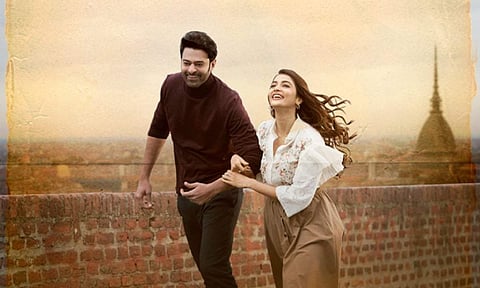Radhe Shyam Movie Review: The romance falls short of magic
Rating:(2.5 / 5)
Predictability is an attribute that always carries a negative implication, especially in film reviews. The degree—and irony, in this case— only multiply exponentially when the film’s protagonist is a palmist who foretells every moment in a person’s life. Few films succeed in putting the viewer feel like the protagonist himself like Radhe Shyam does. Akin to Vikramaditya (a stiff Prabhas), we too attain the ability to predict what will happen next in the film. It’s not that the writing sticks to a hackneyed narrative or doesn’t try to surprise you, it is just that a film, which is centered on prognostication and the idea of fate, barely intends to communicate the perils or joys of certainty.
Starring: Prabhas, Pooja Hegde, Bhagyashree, Sachin Khedekar
Directed by: Radha Krishna Kumar
At one point, Vikramaditya, hailed as 'the Einstein of Palmistry' shares why knowing one’s future is never a good idea. “If you learn about tomorrow's pleasure, you will be stripped off of the surprise. If you learn about tomorrow’s dismay, you’ll lose hope,” he tells a father who is eager to know about his daughter’s future. It’s a great line and a fascinating psyche to explore. The film, however, never intends to get to the depths of Vikramaditya's mind. The farthest it goes to unpack his worldview is the aforementioned dialogue. How does this man—who claims to have knowledge of every moment in his existence, from birth to death—comprehend the mundanity of everyday life? Does he find himself being buried under the weight of disproportionate knowledge? While he looks happy and nonchalant (which can be attributed to Prabhas’ limitations as an actor), is he really at peace with his ability and the pernicious impact it leaves on his life? Exploring at least one of these facets would have rendered Radhe Shyam much more comprehensive and profound.
Radhe Shyam strives to be an epic love story that challenges destiny. The ‘epicness’ in the story, sadly, remains restricted to the visual imagery. The story by itself doesn’t lend gravity to the grandness of the film. Neither does it care to provide you a strong reason as to why the story is set in Europe (where Bhagyashree teaches caucasian kids classical dance, yes). In fact, it took me three scenes to realise that the character played by Krishnam Raju is visually-challenged. Such is the writing.
Coming to the story, the know-it-all Vikramaditya doesn’t believe in relationships; he wants flirtationship (which, upon Google-ing, I discovered is an actual term). “You do everything lovers do, expect loving each other,” he defines it to Prerna (Pooja Hegde), for whom he falls on first sight. Vikramaditya knows where life leads him and is cognisant that his palm doesn’t have a ‘love line’, which means, well, he will never find love in his life. This belief restrains him from forging ‘the’ bond with women, even when they love him. Upon the arrival of Prerna, of course, his belief is challenged.
What Radhe Shyam required the most is a script doctor. Perhaps tiny amputations in the inflated post-Intermission sequences—where the film begins to meander without expressing the slightest intent to exploit the conflict—could have saved the film from slipping into a coma until the third act. You can also see the intended ‘twist’ take a boat ride and come at you.
What the film lacks in writing, it tries to compensate through a few ‘epic’ moments. Perhaps the one that comes closest to the ‘magic’ it aims for is the first rendezvous between Vikramaditya and Prerna in a moving train. It’s a beautiful moment, skilfully invigorated by Thaman’s background score; we see the camera (shot entirely on green screen) deftly move from top to bottom, capturing the water below them and the sky above. A more elaborate interaction that follows, where both of them communicate through writing on the windows of school buses (I kept marveling at the ease they write inverted letters with their fingertips) substantiates the fairy tale treatment the film keeps aiming for. The magic in the writing ends there. It needed more high points to keep us captivated, especially when the lead characters are uninteresting individuals.
Credit where it’s due, the very fact that a star vehicle with a canvas as massive as this chose to use the protagonist’s worldview as the primary conflict is a commendable choice. I also liked that the story finds its resolution through the evolution of Vikramaditya’s thought process, not through the elimination of an external villain. Moreover, the idea of pitting Vikramaditya’s belief against Prerna’s in the climax is fascinating, although the lead-up towards it feels like a plot point curtly thrown into the narrative to catapult it towards the climax.
The film gets a great deal of support from pleasing imagery and a soothing soundtrack. Justin Prabhakaran's songs pump life into even stale montages; they make up for the chemistry that's non-existent between the leads. Likewise, Manoj Paramahamsa's cinematography and Ravinder’s production design are the two lifelines and their craftsmanship is a feast for the eyes. Be it the Europe of the ‘70s or the interiors, they look gorgeous in every frame. One of the best frames in the film has the leads seen inverted through two fish tanks as the sun sets behind them. There’s an effort to accentuate and beautify every frame. It bolsters the proceedings tremendously because the situations the characters find themselves in are largely forgettable. Though one might feel the palette does get cloying towards the end, Radhe Shyam’s reliance on visuals doesn’t let it down once. Even if it's overdone, the ravishing visuals only corroborate the epic aura the filmmaker is hellbent on achieving.
Radhe Shyam is one exquisite film to look at from the outside. However, will it make you inquisitive about the story enough from the inside? Not really.

